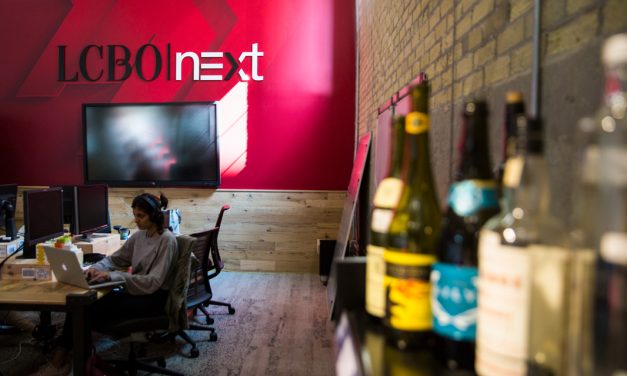Nothing is more frustrating for an employee, customer or client than daily workflows that are full of friction – procedures that don’t work smoothly or are rooted in legacy systems or old tech.
The LCBO’s corporate innovation lab has a mandate, in part, to bring its expertise to bear and make life easier for the company’s vendors and employees, saving time and money in the process.
On that count, almost two years to the day since Danny Ho and his team of developers at LCBO Next opened the lab’s doors, some big, can-do wins are under way.
“Technology. Product. Process. Culture,” says Ho. “Our approach is ground up. What do we need and what can we build?”
Here’s an example.
When the LCBO’s system for ordering beer for its stores was designed, craft beer wasn’t yet a popular product, and so wasn’t included. So, when demand for craft beer quickly grew, getting product into the stores proved difficult. Individual stores had to resort to picking up the phone and placing orders themselves with the brewers. The process was slow and inefficient on both ends.
“So we wondered: How can we help [the craft brewers] co-ordinate and collaborate with the stores more effectively?” says Ho. “Hurdle past the current system.”

The LCBO’s corporate innovation lab. “We ask ourselves tough questions. We break
down barriers,” says lab director Danny Ho. (Communitech photo: Sara Jalali)
A meeting was convened. Store staff, LCBO head office personnel, the craft brewers association and several individual brewers, all met at the lab’s Communitech storefront, and the beginning of a solution took shape.
“We made a very customized confirmation system that let the craft folks quickly see what was being ordered and quickly confirm based on the numbers they had, and let them see [each] shipment by what date. Now the store had a centralized place that didn’t require a back-and-forth and phone tag.”
The system Ho’s team designed has been test driven since last March at 25 LCBO stores in the Brampton area. Discussions are now under way to explore how to roll it out more widely.
“Our vendors, as of the June report, had 95 per cent compliance or adoption with the order processing workflow,” says Ho. “So there’s uptake like you cannot believe. The effects on the users is huge.
“We’ve learned on all fronts [that] time is being saved. Stores are taking fewer calls. Vendors have what they need to get their work done so they’re bugging stores less. So that one is a big win.”
The wins are engineered by the lab’s four co-op students and two full-time developers, of which Ho is one. Students are trusted with responsibility and given latitude and encouraged to express their opinions. Problems become opportunities for get-it-done creativity. Another example:
Grocery stores, as most Ontarians know, recently began stocking beer on their shelves. The LCBO serves as the grocer’s point of contact, taking care of invoicing and ordering and dealing with problems when an order is short-shipped or breakage or spillage occurs.
“It’s kind of like you ordering cookies from Amazon,” Ho says. “When the cookies come to your house crumbled, you don’t call the cookie manufacturer. You tell Amazon, ‘My cookies were broken.’ Amazon gives you the refund, right?
“So in this case, [grocers] contact the LCBO and we do the adjustments.”
The problem faced by both sides was once again one of process. A grocer who intends to make a claim and document a problem must print out a form, fill it out and fax it in. Emails then fly back and forth. Time is invested on both sides. The process is slow, clunky. The fix?
“So, two parts,” says Ho. “One part was building an application for grocers to very quickly take photos of the product that they’re claiming. And any other information related to the order – bill of lading, what have you.
“They have user profiles so they can very quickly call up [and identify] who they are, pull it up in the app and send us the claim very quickly.

(Communitech photo: Sara Jalali)
“And we then also built a portal for grocery [operations] to use at their head office. So the grocery ops team can reduce their workload of processing, synthesizing all the claim information from paper forms to just logging in, checking [the claim] through a web portal and accepting, denying or asking for more info.
“The app additionally allows users to send messages back and forth and submit supplemental information if it’s needed.”
The app has been piloted in select stores. A process that once took 12 to 15 minutes per claim has been reduced to two to three minutes.
The fix has not only acted as balm for a sore spot, but has generated goodwill and proven capability.
“There’s nothing like having our customers happy with what we’re building so when we want to try new things they’ll be more open about it and more willing to take part.”
Ho has a long pedigree in Waterloo Region. He obtained a Bachelors and Masters degree from University of Waterloo in systems design engineering in 2002 and 2004 respectively, and then went to the U.S., where he obtained a PhD in information systems. He and his wife, who is also an engineer, made, he says, “a very deliberate choice to come back” to Canada in 2009.
“We knew this was the place to grow family but also professionally.”
Ho was a member of the original team that launched Canadian Tire’s innovation lab in 2013, the first of its kind at Communitech. Working at the lab, he said, gave him “a very large appetite for risk,” one he’s putting to use with the LCBO.
“We’re trying to find how we can teach ourselves to work faster and be more nimble. Learn to grow our appetite to try new things.
“So, from a tech perspective, it’s very bespoke. It’s purely business-value driven. We ask ourselves tough questions. We question why we’re doing things. We break down barriers.”
Like the one that unfolded last summer, when an electrical problem caused the power to go out at the Tannery, forcing a temporary evacuation. Ho had a meeting scheduled with one of the LCBO’s vice-presidents and the firm’s chief information officer, who had driven in from Toronto. Solution?
“We went to my [house] and had the most on-time meeting you can imagine. It worked out well. That’s part and parcel for how you do things around here.
“I think people are highly motivated to succeed and contribute.”

